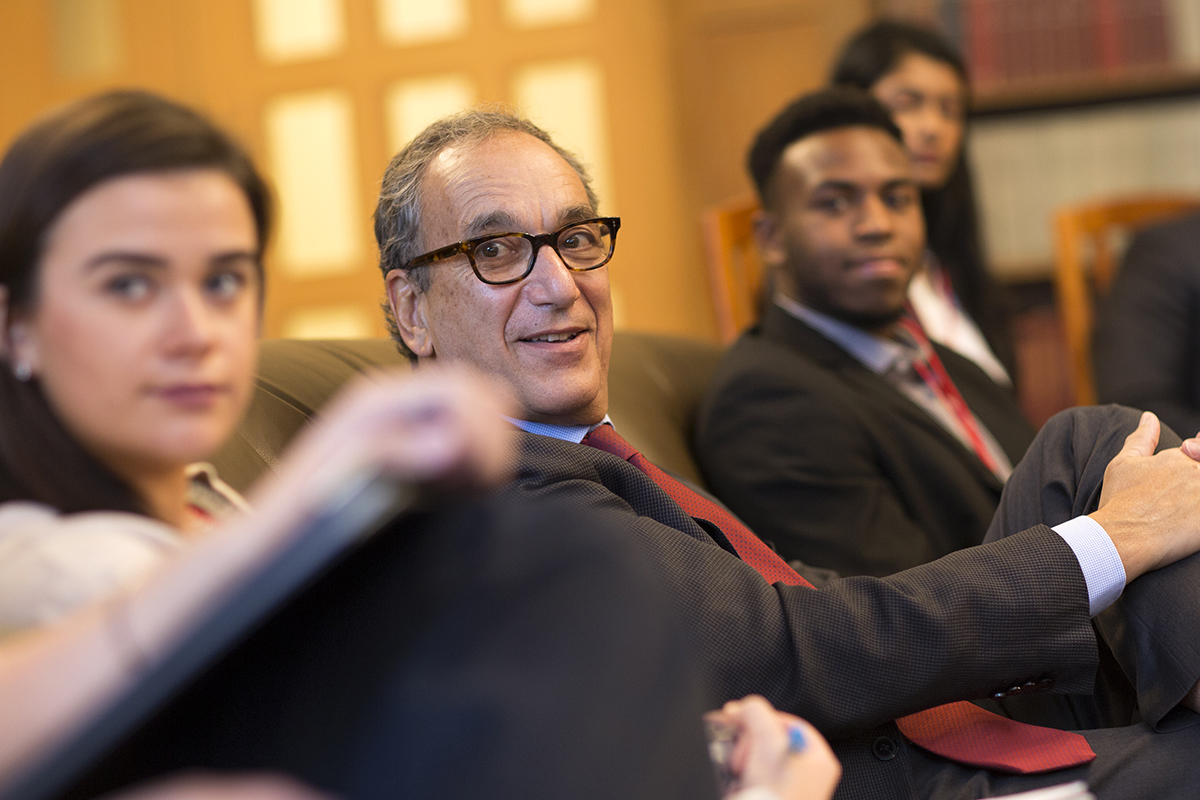Scangos: Powerful medicine, not profit, is top biotech priority
By Susan Kelley

When George Scangos ’70 was a freshman at Cornell, he had planned on majoring in French. But a biology class with the illustrious professor William Keeton changed his mind – and with it, America’s biotech industry.
Scangos is CEO of Biogen, one of the most valuable biotech companies in the country, with a market capitalization of $57.5 billion. How does Biogen increase shareholder value when a research breakthrough can easily take 20 years to develop?
By putting a laser focus on patients’ needs, Scangos said Oct. 27 in Alice Statler Auditorium, as the 34th Robert S. Hatfield Fellow in Economic Education.
“Patients are why we come to work every day,” Scangos said. “I don’t get motivated … by making wealthy hedge-fund managers even wealthier. I get motivated because there are patients out there in dire need of better therapies. And we have the ability to bring those therapies to those patients.”
Many patients suffer from their illnesses more than they let on, Scangos said. “The human cost for the patients and their families is more than most people realize,” he said.
Scangos’ talk, “Shareholder Value and Drug Discovery – Balancing Science, Patients and Wall Street,” was the highlight of his campus visit. He was introduced by Interim President Hunter Rawlings, who moderated a Q&A after the talk.
Scangos, who joined Biogen as CEO in 2010, is credited with leading a successful turnaround of the then-struggling company. During his tenure Biogen’s earnings have more than tripled and its revenue more than doubled. In 2015 Fortune named him one of the top 10 CEOs of the year.
His strategy was to shut down Biogen’s oncology and cardiovascular research and focus instead on developing treatments for neurodegenerative diseases such as Alzheimer’s and Parkinson’s.
Scangos acknowledged that medicines come with copays and co-insurance fees that are unaffordable for many patients, and that issue must be addressed, he said.
But there is a rationale for the drug prices biotech companies charge, said Scangos, who is chairman of the Pharmaceutical Research and Manufacturers of America. That is the cost of research and development.
The biopharmaceutical industry spends 17 percent of all U.S. research and development dollars, by far the largest investor. And 92 percent of all publically traded biotech companies lose money each year; only 8 percent are profitable. The net return of all biotech companies together is between 4 to 6 percent.
“If there is an inability to charge what we charge, it will have a really depressing effect on the biotechnology industry in the U.S.,” he said.
During the Q&A, a student from the Samuel Curtis Johnson Graduate School of Management asked how Scangos keeps his focus on Biogen’s core products while facing pressure from shareholders to turn a profit.
“I understand very well the necessity to, let’s say, service the short term – make sure that our quarterly earnings are at or above projections while we invest in the long term,” he said.
That’s easy when the company is doing well, Scangos said. But it gets harder when revenues are increasing only marginally.
“You have to invest in the future. You just have to. And research is not something you can turn on and turn off. If you start it, you’re making a 10-year commitment, and you’ve got to stick to it. Because if you stop it, then all the money you’ve spent is wasted,” he said.
“So you have to be thoughtful about the commitments you make and tough on prioritization. You have to do experiments so you can kill things early, rather than after you’ve spent hundreds of millions of dollars,” Scangos said. “And if you do all that, then you can do both.”
The Hatfield fellowship is one of the highest honors Cornell gives to industry leaders, promoting an exchange of ideas between the academic and corporate communities. Every year the Hatfield fellow spends a day on campus to interact with faculty and students, and delivers a public lecture. The fellowship is funded by the Robert S. Hatfield Fund for Economic Education, established in 1980 by the Continental Group Foundation to honor its then chairman, president and CEO, Robert S. Hatfield ’37.
Media Contact
Get Cornell news delivered right to your inbox.
Subscribe